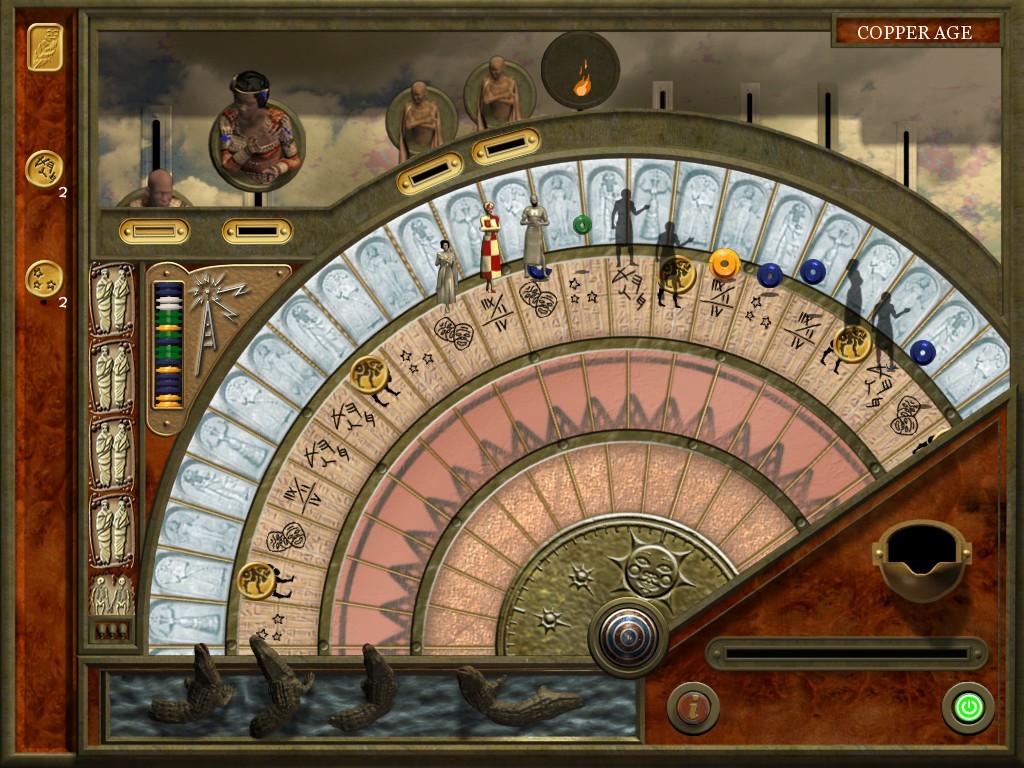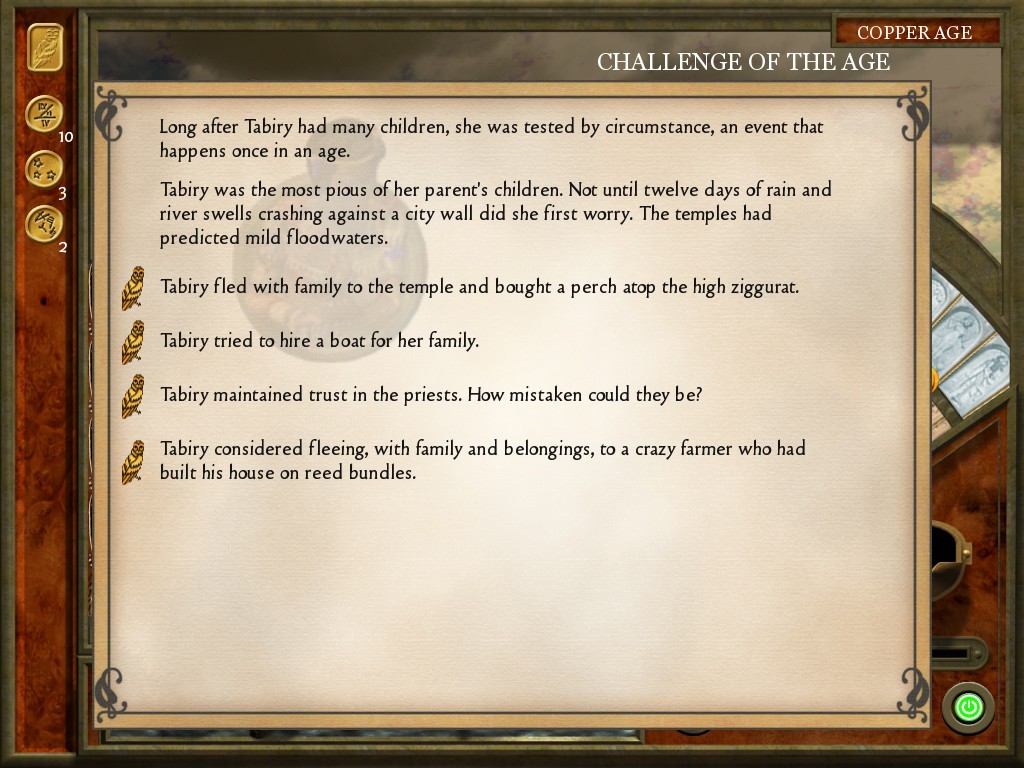Few games promise you a narrative that spans multiple centuries and multiple generations. Even fewer can actually pull it off. 7 Grand Steps: What the Ancients Begat not only delivers on a sprawling player-driven story, but also makes the process look astonishingly simple. Played like a board game yet far more complex than most physical board games, 7 Grand Steps is at once very elementary and very complicated. It has its frustrations, but it also triggers the same "one more turn" craving you get from the best board and strategy games.

While at first glance 7 Grand Steps has the look of a simple board game (albeit with cool penny-arcade-style mechanical pieces), it's really something that wouldn't be feasible on a physical tabletop. In fact, it's a unique mix of board game, family simulation, and choose-your-own-adventure story with a dash of Sid Meier's Civilization added for good measure. The many layers combine to create an experience that is complex enough to get lost in, yet approachable to beginners just getting their feet wet.
The majority of the game is played by moving character pawns around a wheel using a variety of tokens marked with different symbols, each with a different skill associated with it (beginning with things like irrigation and masonry, but later advancing to the likes of mathematics and harbors). The wheel on which your pawn rests rotates each turn, and if you don't take care to spend tokens and move forward, you will be caught and eaten by crocodiles as the wheel rolls off the screen. Getting more tokens requires moving backward (or at least staying in place), so you need to balance token production with forward progress. That part is simple enough; move forward or die. But 7 Grand Steps is about more than any one pawn: it's about lineage.
You are almost always controlling two pawns: a family member and his or her spouse. When they occupy the same space, they have a chance to produce a child. When raising children, you have the option of spending your tokens (the same ones used for movement) to educate them and better prepare them for adulthood. This is essential, because your current pawns grow old and die before you know it, at which point one of their children must take over. How well you prepared them as children determines how likely they are to survive their own life challenges. If you gave a child plenty of alphabet tokens, for example, he or she is more likely to produce alphabet tokens as an adult, which in turn helps both movement and the next generation of children.
This goes on from generation to generation, with the young adults following in the footsteps of their ancestors as they move through the ages. All the while you are collecting legend points. You collect most of these by landing on spaces that contain them, but you occasionally acquire them through other means as well, including random story incidents that pop up as you play. Collect enough of them, and your family benefits from whatever sort of legend you chose to work toward: discovery, heroics, or social advancement. Discovery legends upgrade one of the symbols on the game board (for example, masonry becomes arches) and give your family advantages in the impending "challenge of the age," which occurs when moving from one age to the next. Heroic legends are more narrative-driven and similarly provide advantages to your family (though their effects are unclear on the surface).

Social advancement is one of the more interesting paths to take because, eventually, it changes a lot about the game. Every time you climb a rung on the social ladder, you move to a larger track on the game's board. When you reach the outermost track, the noble class, you are given new gameplay tasks via a "ruling game," which fundamentally changes what you do each turn, depending on the age in which you currently live. The Bronze Age's ruling game, for example, is something of a text-based military simulation in which you allocate resources in order to attack, defend against, or trade with neighboring civilizations in an effort to appease your king. These ruling games are the most involved bits of gameplay in 7 Grand Steps, but it can take hours just to reach the point where playing them is an option (if you even experience them at all).
Even though all of this is explained as you begin your first game and as each layer of gameplay is introduced, it can be a little confusing until you play several turns and get a feel for how the game flows. Before long, you find yourself plagued by a compulsion to keep playing just a few more turns, to advance a little further to see how your choices pan out. Next thing you know, minutes have turned to hours, and you wonder how you spent so much time staring at such a relatively static screen.
Unfortunately, 7 Grand Steps has a bit of an identity crisis when it comes to whether or not it wants to excel as an objective-based game to be won or as a clever, interactive way to tell a story. There are a lot of moments during which your success or failure in the game feels too far out of your control, where choices you want to make are unviable, resulting in a big loss in progress (even if, in reality, all your past successes and failures directly resulted in your outcome). Such moments feel as if they hinge far too much on luck, rather than on measurable skills.

As an example, the "challenges of the age" you encounter when moving from one age to the next are some of the most important choose-your-own-adventure-style sections in the game, involving a lot of choices that determine whether or not you and your family make it to the next phase of history. The problem is that it is incredibly easy to make the wrong choice and fail a challenge, which kills your family. While an old-school choose-your-own-adventure novel would tell you to turn back to the previous page and try again, 7 Grand Steps forces you to roll back to an "untried sibling"--a brother or sister who may make different decisions than your last pawn did. This is an annoying loss of progress, and it's never made clear why a choice resulted in a failure (other than as a result of seemingly arbitrary narrative decisions), or what you could have done to stop it. Would you have had more success at, for example, making treaties with neighboring cities if only you had completed different legends throughout the game previously? The game doesn't say.
Furthermore, you often have choices during these challenges that are, at best, morally questionable. These options are great to have, but you may find that you can't easily survive without taking the moral low ground, which makes the story feel less like its yours and more like it's a tale that's merely being told to you. If the choice you want to make isn't going to be successful, why are you offered the choice at all? Why must an option that seems viable automatically lead to failure?
This mechanic works when viewed as a metaphor, and if you go into 7 Grand Steps purely to see it weave a narrative, you might find something to admire. When a character's daughter has a harder time in life purely because she's a woman, or when ruthless ambition gets you further in life than thoughtful charity, you might applaud the fact that the story is pulling no punches in its depiction of how the ancient world worked (and in many ways, how the modern world still operates). Seen through the lens of a simple game, this message can be powerful and effective. For a game that you might play the way you play a "typical" board game, however, such design choices can be frustrating and will turn off more-casual players.

But even with these frustrations, there is a strong urge to keep the story going, no matter the cost. By the end of your family's journey, which could easily take more than 10 hours and span more than two dozen generations, you're still ready to see what comes next--something that's promised as the endgame splash screen promises your family will carry over into Step 2 of what's intended to be a series.
It's almost puzzling why 7 Grand Steps is as engrossing as it is. It has no multiplayer option, yet even without that social hook, it feels strongly competitive. There is both a little and a lot to the package, and it is at once simple and complex. Mousechief strikes enough balance with all of these elements to make 7 Grand Steps worthwhile as both a story and a game, even when both sides have faults.